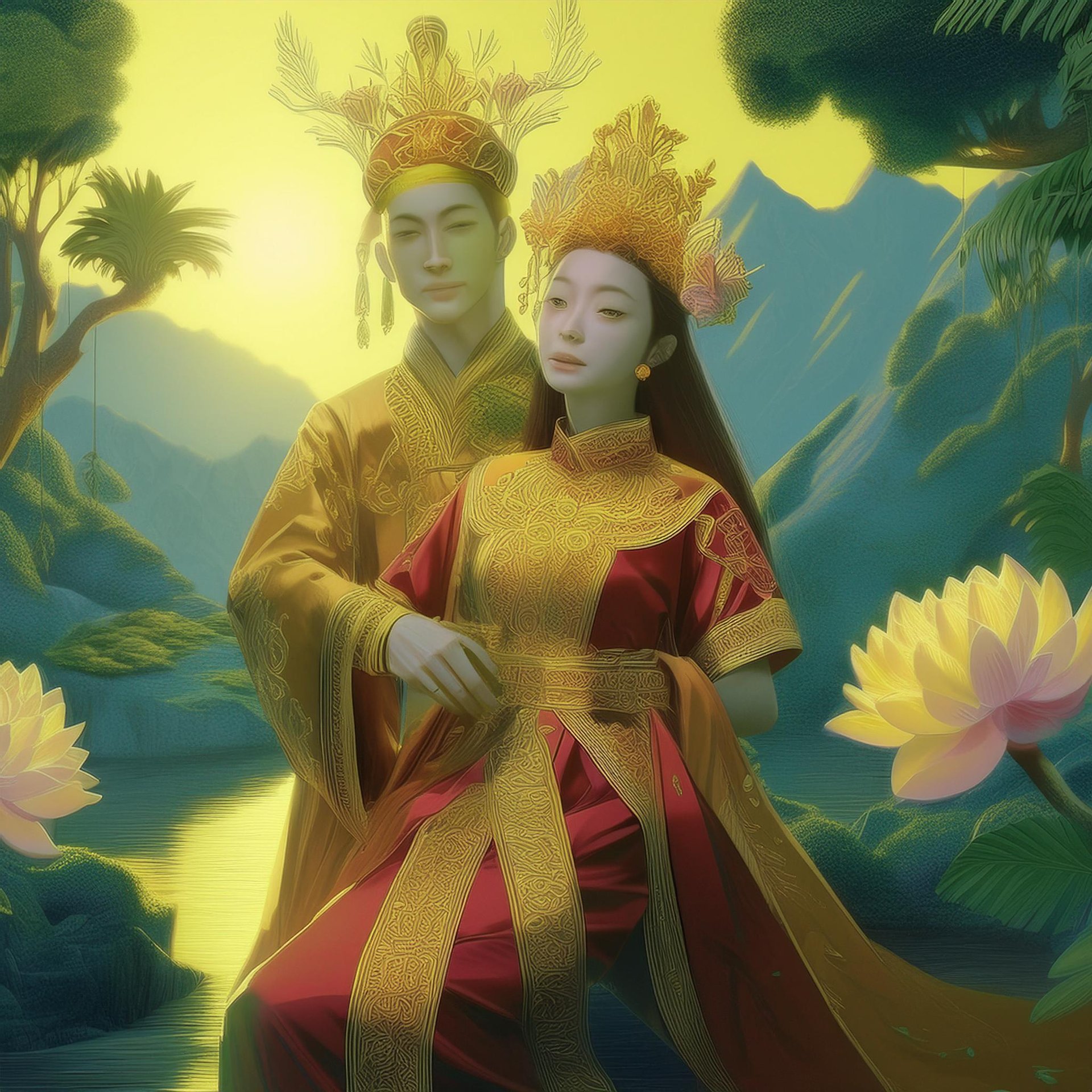The Dragon and the Lion: A Tale of Two Cultures in Bali
Myth/Legend


Long ago, beneath the watchful eyes of Bali’s volcanoes and amidst the whispering winds of its lush rice terraces, a love story unfolded. This was not just any love story, but one that would shape the spiritual and cultural soul of an entire island. It was the story of King Jayapangus of Bali and Kang Cing Wie, the daughter of a Chinese merchant—two people from distant worlds whose hearts, and fates, became intertwined.
Their union wasn’t merely one of love, but of two ancient cultures that would forever leave their mark on Bali’s sacred lands. And today, as you wander through Bali’s temples, its festivals, and even its daily life, you can still hear echoes of this story—the tale of the dragon and the lion, the tale of Bali and China.
The tale begins in a time when Bali was a vibrant kingdom, ruled by Jayapangus, a wise and curious king. His kingdom prospered, but as a leader, he sought more than just wealth or power. He wanted to forge connections, to understand the wider world. And so, as Chinese merchants began arriving on the shores of Bali, trading silk, porcelain, and exotic spices, Jayapangus welcomed them with open arms.
Among these merchants was a man who had traveled far, not only to trade, but to give his daughter, Kang Cing Wie, a better life. Kang Cing Wie was known for her beauty, grace, and intelligence—her eyes sparkled with the wisdom of her ancestors, and her every movement was as fluid as the silk her father sold.
When King Jayapangus first saw her, the world seemed to stop. Her presence, so elegant yet strong, captivated him. And in turn, Kang Cing Wie saw something in Jayapangus—an openness, a respect for her people and their customs that set him apart from other kings.
Despite their different worlds, their love blossomed. Their marriage was a grand affair, a celebration that symbolized more than just the union of two hearts—it was a merging of two rich cultures, blending Balinese traditions with the deep, spiritual essence of Chinese heritage.
The Dragon and the Lion in Bali’s Sacred Spaces
As the years passed, the bond between Jayapangus and Kang Cing Wie grew deeper, and so did the influence of Chinese culture in Bali. Just as their love intertwined, so too did the spiritual symbols of their cultures.
One of the most striking of these symbols is the Barong—the mystical lion-dog figure that protects Bali from evil. Though the Barong is deeply rooted in Balinese mythology, if you look closely, you’ll notice something familiar. The Barong, with its fierce face and flowing mane, carries the soul of a dragon, a creature revered in Chinese culture for its power and wisdom. It’s as if the Barong itself is a reflection of the love between the lion-hearted king and his dragon-born queen, embodying both Balinese strength and Chinese grace.
Red, the color of joy and prosperity in Chinese culture, began to appear more and more in Bali’s temples and rituals. It wasn’t just a color, but a blessing—a way to weave Kang Cing Wie’s heritage into the island’s spiritual fabric. Temples glowed with the warmth of red lanterns, offerings glistened with red threads, and the vibrant hue could be seen in every corner of Bali’s sacred spaces.
Even the dragons—symbols of protection in Chinese mythology—found their place in Bali. Carved into the stone pillars of temples or painted on ceremonial banners, these dragons began to coil their way into Bali’s spiritual life, standing side by side with the island’s own deities, watching over the people as silent guardians.
The Tragic Twist in the Tale
But as in all great love stories, there is often a shadow that falls over the light. Despite their deep love, Jayapangus and Kang Cing Wie faced a hardship that weighed heavily on their hearts—they could not have children. This absence of an heir troubled the king deeply, and in his desperation, he sought the guidance of the gods.
One fateful day, Jayapangus journeyed to the sacred mountains, hoping to find answers. It was there that he met Dewi Danu, the goddess of the lake. Enchanted by her divine beauty, Jayapangus fell under her spell and, in a moment of weakness, took her as his second wife.
But the gods do not look kindly on such betrayals. When Kang Cing Wie discovered her husband’s infidelity, her heart shattered. The goddess Dewi Danu, too, was filled with fury. In a tragic turn, both Jayapangus and Kang Cing Wie were consumed by the wrath of the goddess, their love story ending not in joy, but in sorrow.
Yet, even in death, their legacy lived on. The Balinese people, moved by the story of their king and his Chinese queen, honored them in temples across the island. At Pura Dalem Balingkang, where their spirits are said to dwell, offerings of Chinese coins and red ornaments are still made to this day, ensuring that the bond between Bali and China remains strong, even in the afterlife.
A Legacy of Harmony and Friendship
Though Jayapangus and Kang Cing Wie’s love ended in tragedy, their story is not one of sorrow, but of harmony. It is a reminder that from the blending of two cultures, something beautiful can emerge—a legacy that endures through time.
Today, as Balinese communities celebrate Chinese New Year with dragon dances and vibrant red decorations, as they light incense in temples adorned with both Balinese and Chinese symbols, the spirit of Jayapangus and Kang Cing Wie lives on. Their love continues to be celebrated, not only in myths and rituals but in the daily life of the Balinese people.
And so, the tale of the dragon and the lion lives on, not just as a story of the past, but as a living testament to the power of cultural exchange. It reminds us that Bali’s spiritual richness is not the product of isolation, but of openness—a willingness to embrace the new, while holding fast to the old.
As you walk through Bali’s temples, feel the gentle breeze along its shores, or witness a festival procession winding through the streets, you may catch a glimpse of the dragon’s coils or the lion’s fierce gaze. And in that moment, you’ll know—you are part of a story that began long ago, when a king and a merchant’s daughter showed the world what happens when love brings two cultures together.
123-456-7890 hello@toyaubud.com


Jl. Raya Kenderan Tegalalang, Gianyar - Bali
